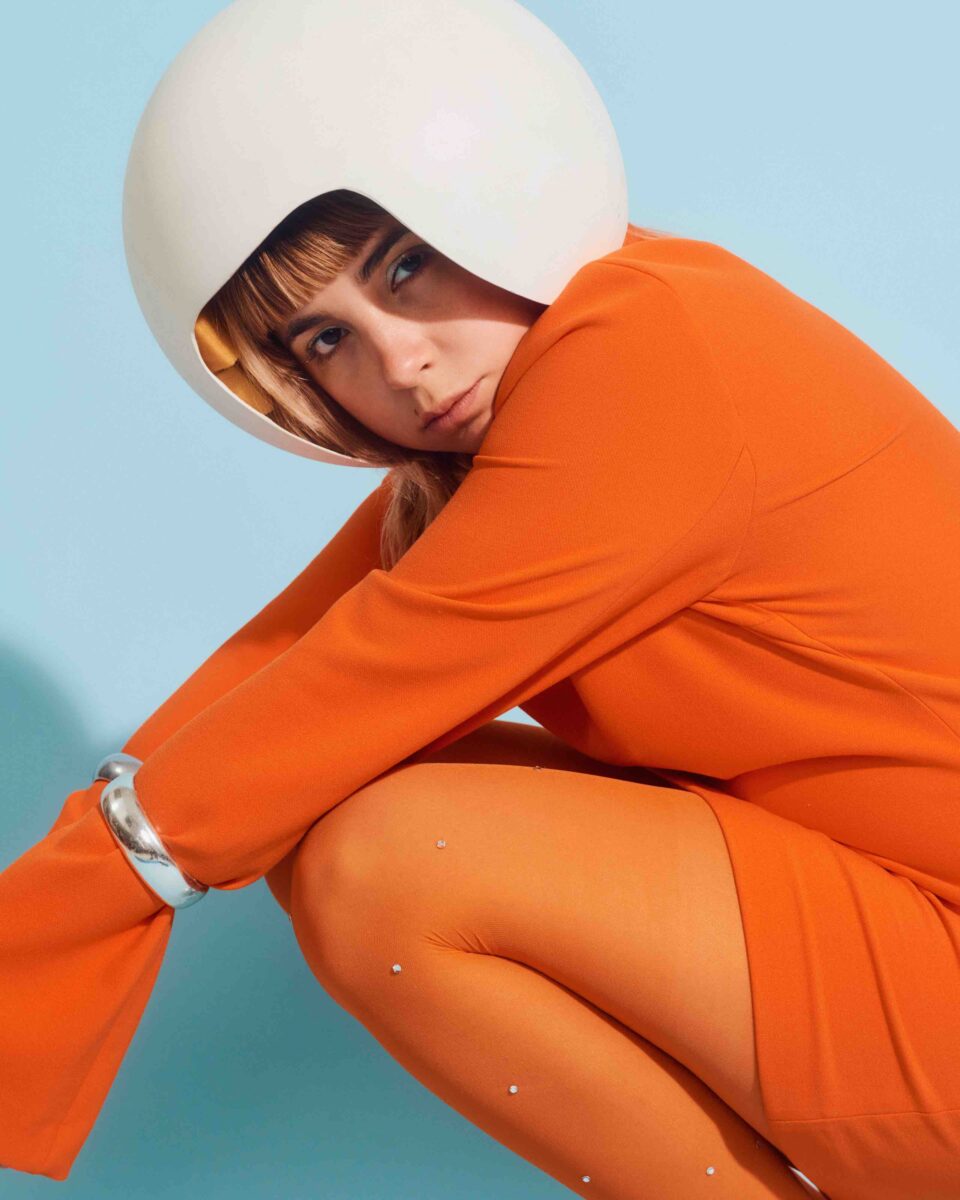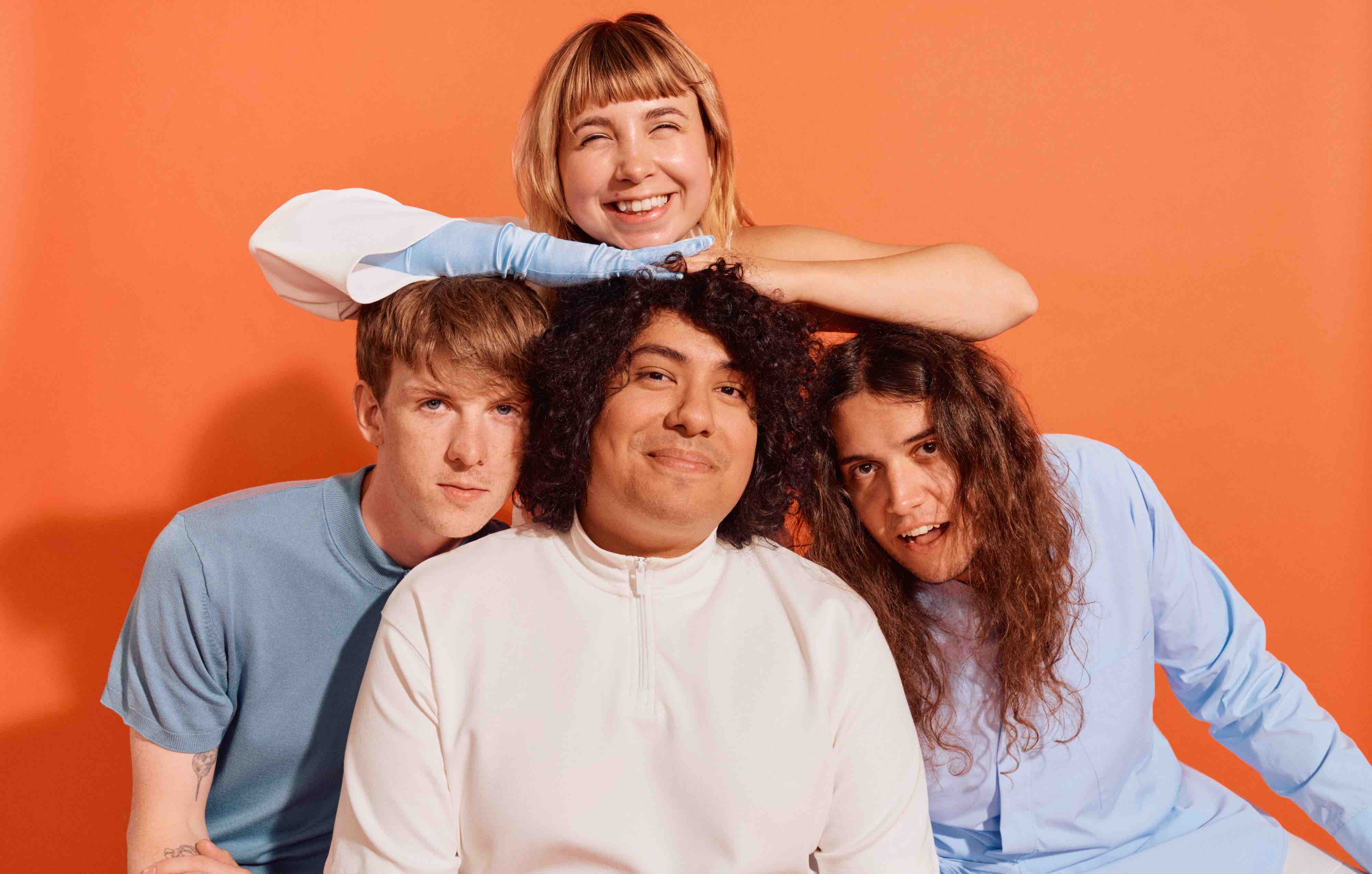At her first-ever show in London, Lili Trifilio played what might be her favorite song from Emotional Creature, her sophomore record with Beach Bunny. Since it hadn’t been released at the time, she led the audience through a practice run of the ending bridge on “Weeds,” an irresistible chant: “You keep taking another piece of me / Not your problem / Not my problem.” But the crowd at Camden Assembly that night didn’t need much encouragement: “The song stopped, but the audience kept singing that line really, really loud—almost screaming it with no music behind them,” she recalls a month later over Zoom. “I’m excited for the moment where people know the song well enough that I don’t even have to teach them; we’re all just screaming it together and having that letting-go moment.”
It’s that kind of spontaneous outpouring that makes up the very DNA of Emotional Creature. From its dealings with zero-G euphoria to its run-ins with shame and anxiety, the record finds the Chicago-based singer/songwriter wrestling with the futility of running from her feelings, going beyond even the heart-on-sleeve pop rock of her 2020 debut LP, Honeymoon. “I’ve come to peace with a lot of stuff from the past few years, and I’ve realized that I shouldn’t be shameful of being a sensitive, emotional person,” says Trifilio. “I feel things in a big way, and it gives really good fuel for songwriting, so I just gotta embrace it.”
She takes command of it musically and visually, too, filling the record with more studio experimentation, writing more adventurous bridges, and styling herself as an intergalactic pop star in the album’s visuals. Trifilio recently spoke with us about conceptualizing these videos and setting boundaries on her private life even as Beach Bunny boldly goes in front of ever-larger and farther-flung crowds.
There’s a bit in the press release about how producer Sean O’Keefe encouraged you to take the creative reins in recording. Are there any moments on this album where you’re particularly proud of having had that say?
Totally. In general, I felt more confident leading, but I would say "Scream" stands out. That was a very complicated song to write, just in terms of getting it from a bedroom recording to how all the layers were going to build. I think there was a lot of trust that day. He kind of just left me alone with the synths and stuff, and I was like, “Guys, I got this, I’m just gonna need a couple hours, don’t come in here” [laughs]. It was really sweet that everyone just truly gave me that trust and let me figure it out.
There’s a great moment in that song where you actually do scream. What was it like recording that?
It was pretty fun! I kept laughing, though, because it’s not common that you’re doing a full-on, blood-curdling scream in the middle of the song. We planned to do it when I was done recording all the other vocals on the record, so it was cathartic in a way where it was like, “Alright, I’m gonna use the rest of my vocal power now, let’s do one big hurrah at the end.” I feel like when I was trying to explain that I wanted to actually scream on the song, everyone else was thinking I was just going to say the word “scream” really loud, so when I was like, “Let’s go!” and I just let it happen, people were like, “Are you OK, what’s going on?”
“I’m excited for the moment where people know the song well enough that I don’t even have to teach them; we’re all just screaming it together and having that letting-go moment.”
What was it like seeing these songs grow in the process of working on them?
It was amazing. So much of that was done in the studio, and there was this creative freedom of just trying things that Sean super encouraged. With the pandemic, it was almost a blessing and a curse that there was a lack of preparation. There were some band practices, but a lot of it was done organically in the studio, and I think it gave way to more experimentation than in the past, where we’d come extremely prepared, and we don’t want to waver on ideas ’cause we’d invested that time into learning things.
At the end of “Weeds,” for instance, I remember I came to the studio and I was doing a playthrough of what the song was before I was gonna teach it to the band. I stopped at the part right before the end, and I was like, “Yeah, and after this, I don’t really know what to do” [laughs]. Everyone was like, “Oh, you didn’t write an ending?” And I was like, “I know I wanna repeat this phrase over again and use these chords, but yeah, I don’t really know, let’s come back to it.” There was a lot of pausing and coming back to things. It was super freeing and super fun.

You’ve been releasing this space opera trilogy of music videos in the lead-up to the record. Can you tell me about how you developed that visual theme?
Over the pandemic I got really into sci-fi—I’ve kind of always been, but I think I was just consuming more media in general because we were all in lockdown. So I knew I wanted space vibes, and I actually kind of started with the music videos and then the photos and the album art built around that. Sometimes when I’m writing a song, I’m sort of picturing the music video while I’m writing it. So with that, I knew I wanted it to be kind of a hero’s journey. I knew that with the band, I wanted it to be a space team element. And yeah, I wanted it to just be elevated from all the music videos we’ve done before.
“When I was trying to explain that I wanted to actually scream on [‘Scream,’] everyone else was thinking I was just going to say the word ‘scream’ really loud, so when I was like, ‘Let’s go!’ and I just let it happen, people were like, ‘Are you OK, what’s going on?’”
There’s so much detail in the sets and costumes and things. How much went into that for you, in terms of designing the look and the vibe of everything?
I made, like, a PowerPoint [laughs], and then I wrote out…I guess you could say a script, and I put stock images next to certain parts, but truly, the team took all of that and elevated it 100 percent. I was fascinated with the idea of really white hallways and keeping it minimal in a lot of ways, and they executed that so brilliantly. And then at the end of “Weeds,” I really wanted there to be this greenhouse scene, which…I think everything that I described that I wanted was executed brilliantly and elevated beyond what I could picture for the budget and means. They really hand-built all of these sets and nailed that ’70s sci-fi aesthetic flawlessly. The first day on set, my jaw was constantly dropped ’cause I was just like, “What? You built this overnight? How is that possible?”
I just made the connection of the Purple Man and his little plant [in the “Fire Escape” visualizer] and the “Weeds” theme.
I was trying to give him some plant powers of sorts, but in the original concept, I was like, “Alright, we’re doing special effects, we’re doing explosions, we’re doing lasers.” And everyone was like, “We are not an actual movie set, we cannot afford that” [laughs]. I was like, “Cool, well I do want to tie in the plant thing.” [Director Eliza Chance] had come up with the idea of focusing on that plant with the visualizer and making it more like an artistic shot to sort of symbolize that. I really loved how that turned out, too.
I’ve read that you studied journalism in college. Does that influence the way you look at doing press for your music?
Maybe to some extent. I definitely used to get a lot of interview anxiety. Now, I feel like I’m more comfortable talking to people, so I’ve kind of worked through that. I think the only thing I’ve noticed is sometimes it feels like journalists want a very specific angle, which sometimes makes sense—say, now with the album, that’s a focus point. But sometimes they want to focus on something like TikTok, for instance. It doesn’t necessarily bother me, but I do notice it, and sometimes I’m like, “I see what you’re doing, I’m gonna try to steer the convo in a different way.” But I dunno, everyone’s gotta write their story, and I’m just happy to be interviewed.
“I think maybe that’s just an exciting part of doing the music thing. You get thrown into things, and sometimes they’re great, sometimes they’re not great, but at the end of the day, it’s a new experience.”
In terms of interview anxiety, was that just a matter of experience, or was there anything you found was helpful in overcoming that?
I think it was experience. It was also getting more comfortable with small boundaries. Like, if someone was asking me about something that was too personal or felt like it was violating my privacy, just being like, “Oh, yeah, I don’t really feel comfortable with that,” where in the past, I felt like I had to answer those questions, and then I’d have a lot of anxiety thinking about when the interview was coming out. But I think with music stuff I’m pretty much an open book.
You announced recently that you’re going on an arena tour with Panic! At the Disco in September—what’s it like preparing for a show of that scale?
I don’t know, even with all these festivals coming up, it always feels like I’m just being thrown into it, and it’s like, “Alright, you gotta adapt quick.” But yeah, I’m wildly excited for everything coming up. We’ve been going back into the grind of regular band practice, but in a way, you can’t really prepare for these things. I think maybe that’s just an exciting part of doing the music thing. You get thrown into things, and sometimes they’re great, sometimes they’re not great, but at the end of the day, it’s a new experience. FL









